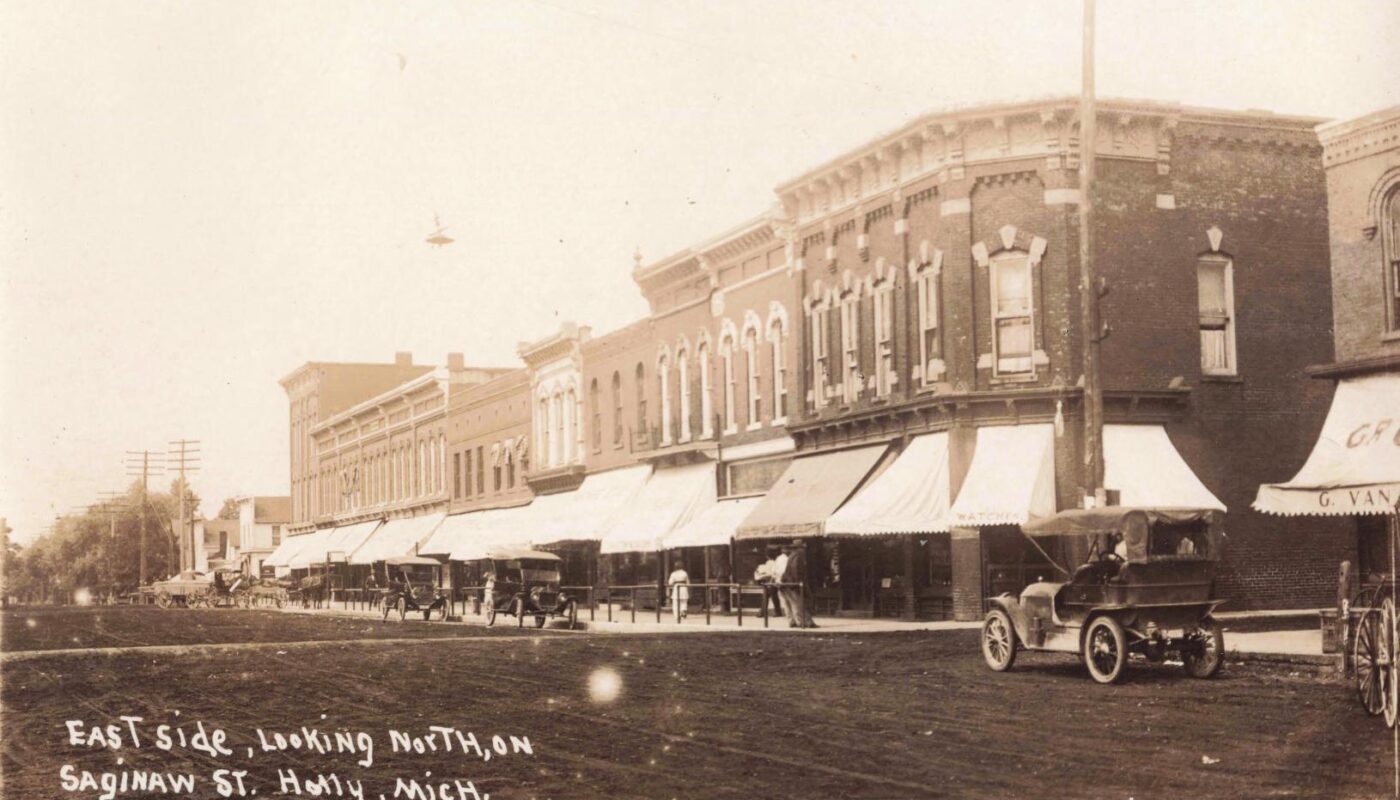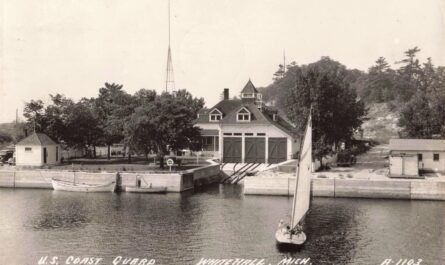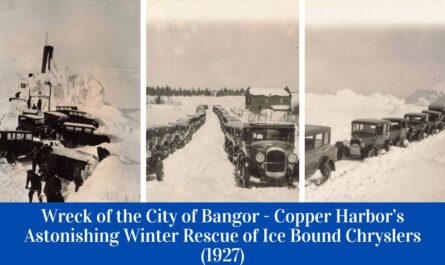When you think of the history of Holly Michigan, you might picture a quaint small town – and you’d be correct, but only up to a point. Holly is a village in northern Oakland County that sprang up in the mid-1800s as a railroad stop. Pioneer Jonathan T. Allen named both Holly Township and the Village of Holly after Mount Holly, New Jersey, possibly inspired by the bright red holly berries found in Michigan swamps. The town grew around the railroads and lumber trade. By 1865, Holly was officially incorporated, and its downtown bustled with shops, hotels, and a busy train depot. In short, the history of Holly Michigan, begins like that of many Midwestern towns – with trains and timber – but Holly’s story soon took some wild turns.
Table of Contents
Video – Battle Alley Brawls and Booming Factories – Holly, Michigan’s Journey
The Railway Depot For Holly
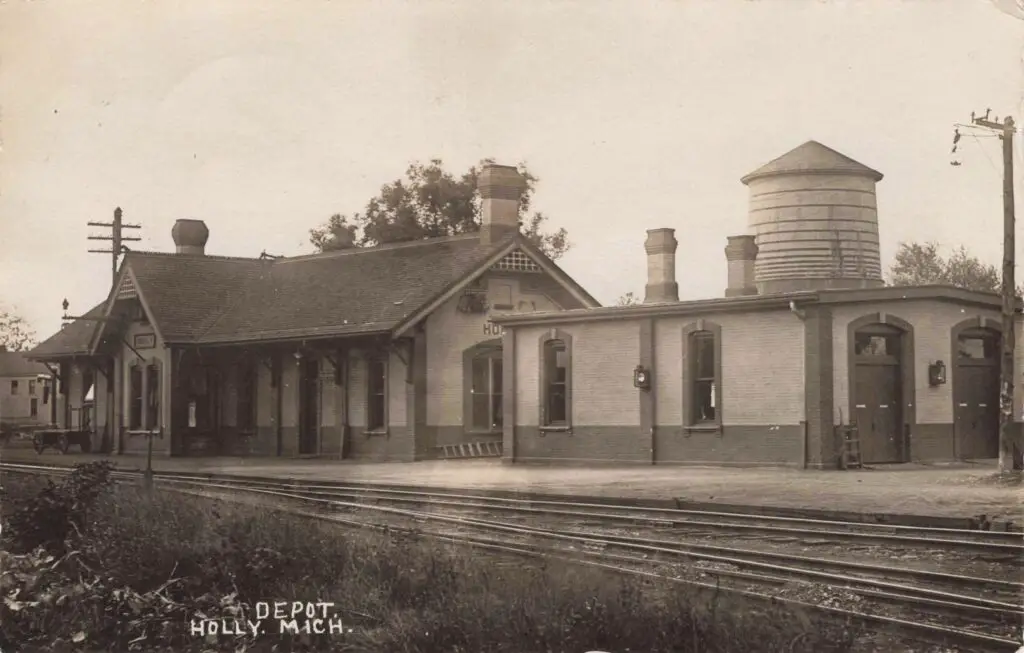
In the late 19th century, Holly became one of Michigan’s first railway junctions, where two major rail lines intersected. Train whistles echoed through town as locomotives hauled white pine lumber from northern forests to eastern markets, stopping in Holly along the way. Saginaw Street and Broad Street formed the heart of the business district, lined with general stores, blacksmith shops, and taverns catering to lumbermen and railroad workers. By all appearances, Holly was a prosperous, tight-knit village. But beneath its quiet, hardworking image, Holly was about to earn an outsized reputation for raucous nights and rowdy characters – enough to make the history of Holly Michigan, something people still talk about today.
The Battle Alley Brawl that Put Holly on the Map
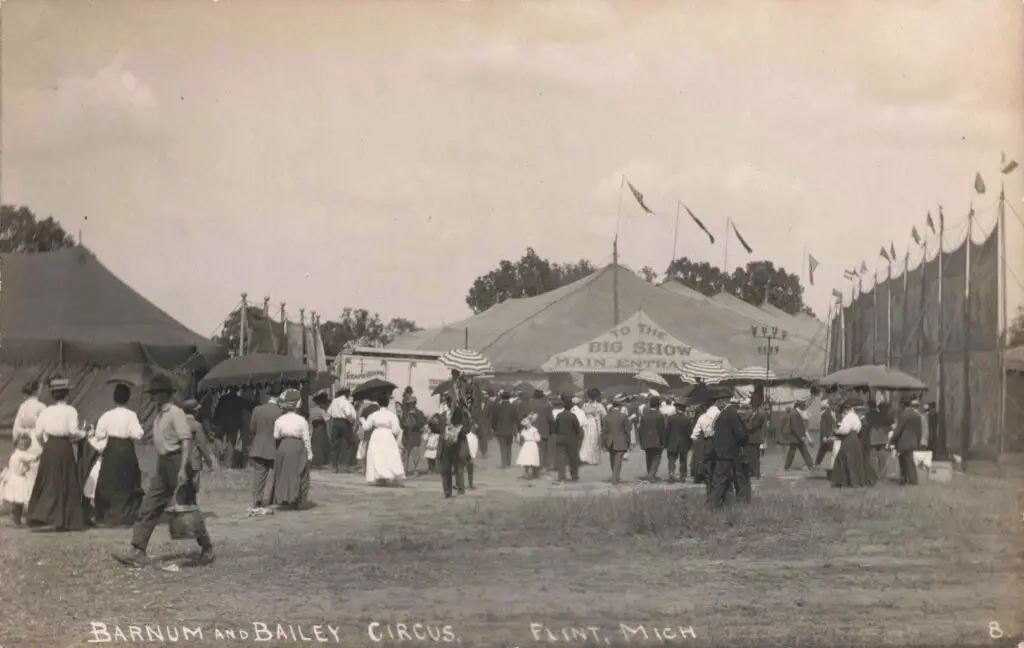
Like many frontier towns, Holly had its share of rough-and-tumble moments. The most famous occurred on a narrow side street called initially Martha Street. One fateful evening in 1885, a traveling circus came to town and set up near this alley. After the show, an altercation erupted between some circus roustabouts and local residents in the street. The scuffle quickly turned into an all-out brawl, with fists flying and onlookers crowding around. So many people ended up bruised and bloodied that the once-sleepy Martha Street earned a new nickname: Battle Alley.
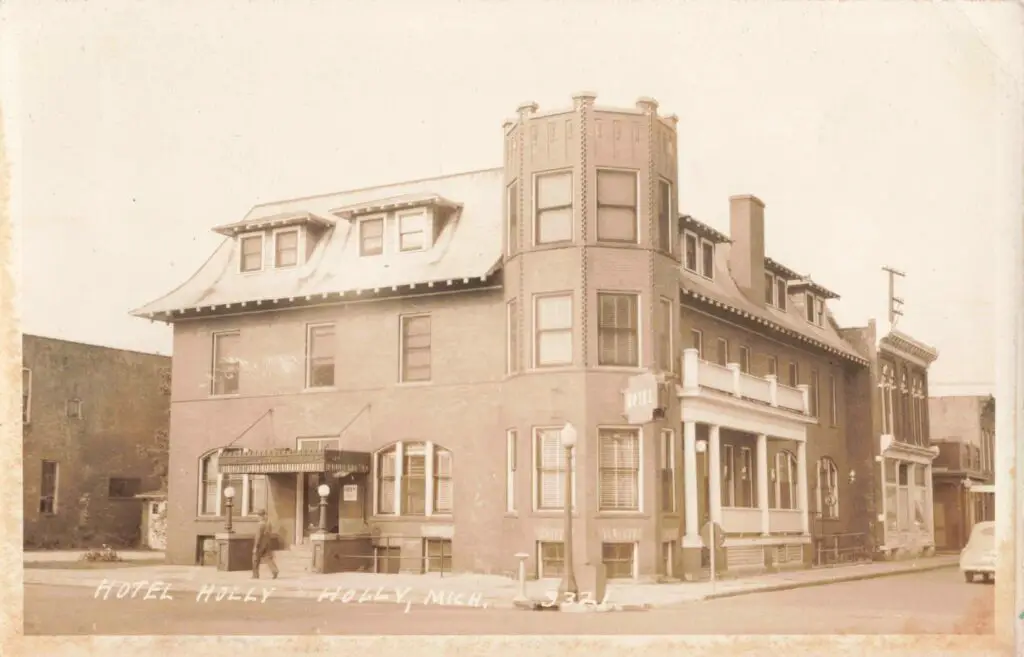
News of the free-for-all spread, and Holly’s little street became locally famous. By the turn of the century, Battle Alley was lined with saloons and known throughout southeast Michigan as a place where a Saturday night might end in a fistfight. Respectable families still went about their shopping on Saginaw Street, but just around the corner on Battle Alley, the scene could get rowdy. This unlikely reputation for boisterous nightlife is a colorful part of the history of Holly Michigan, and it set the stage for an even more notorious visitor to come.
Carry Nation’s Crusade in Holly
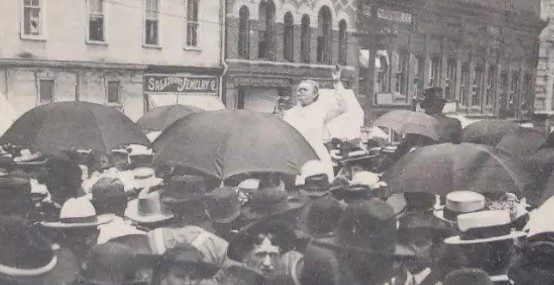
Word of Holly’s rowdy Battle Alley spread far beyond Oakland County. It even reached the ears of a particular axe-wielding lady from Kansas. In the early 1900s, Carry A. Nation was America’s most famous (and formidable) temperance crusader – a woman devoted to the prohibition of alcohol. Carry Nation had made a name for herself by marching into saloons with a hatchet and smashing anything alcoholic in sight. In her own words, she intended to “make all hell howl” in the fight against liquor.
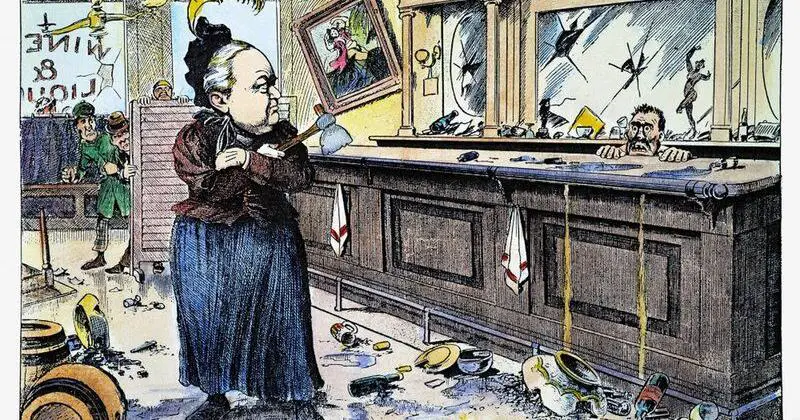
In August 1908, Carry Nation brought her campaign to Holly, Michigan. The 62-year-old activist arrived by train, determined to confront the evils of Battle Alley. She didn’t come quietly. Carry headed straight for the bar inside the Holly Hotel on Battle Alley – one of Holly’s busiest saloons at the time. There, in front of astonished patrons, she demanded the bar close down and swung with her hatchet and bellowed about the sins of alcohol. Eyewitness accounts describe her as a force of nature: a stocky, stern-faced woman in a black dress, swinging her axe and shouting that drunkards would face doom. Startled drinkers scattered (or gaped in shock) as Carry Nation made good on her promise to bring her “all hell howl” to Holly.
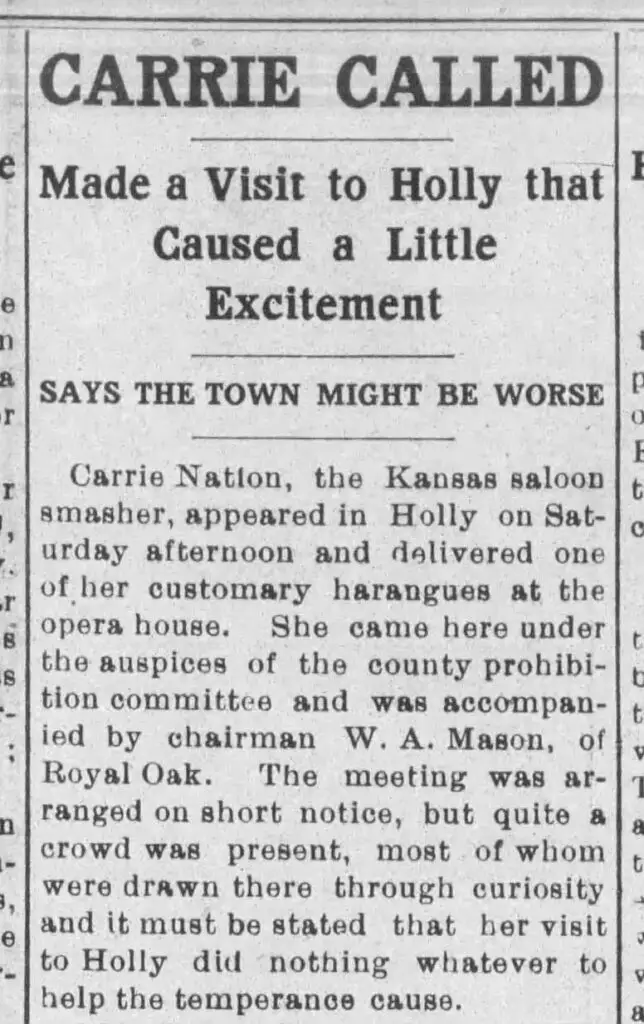
Thu, Sep 3, 1908
The Carry Nation incident in Holly became an instant legend. Newspapers as far away as Chicago picked up the sensational story of the “hatchet Granny” who laid waste to a Holly saloon. Carry Nation likely caused more panic than actual damage – some say she only broke a few bottles and gave the bar a good tongue-lashing. Nonetheless, her visit put Holly on the national map during the fervor of the Prohibition movement. For years afterward, residents recounted the day Carry Nation came to town, and Holly even commemorated it with an annual Carry Nation Festival each September (an event later renamed “Holly Days”). This fiery episode is a centerpiece in the history of Holly, Michigan, embodying the clash between a quiet small town and a big national crusade.
From Lumber Mills to Piano Factories
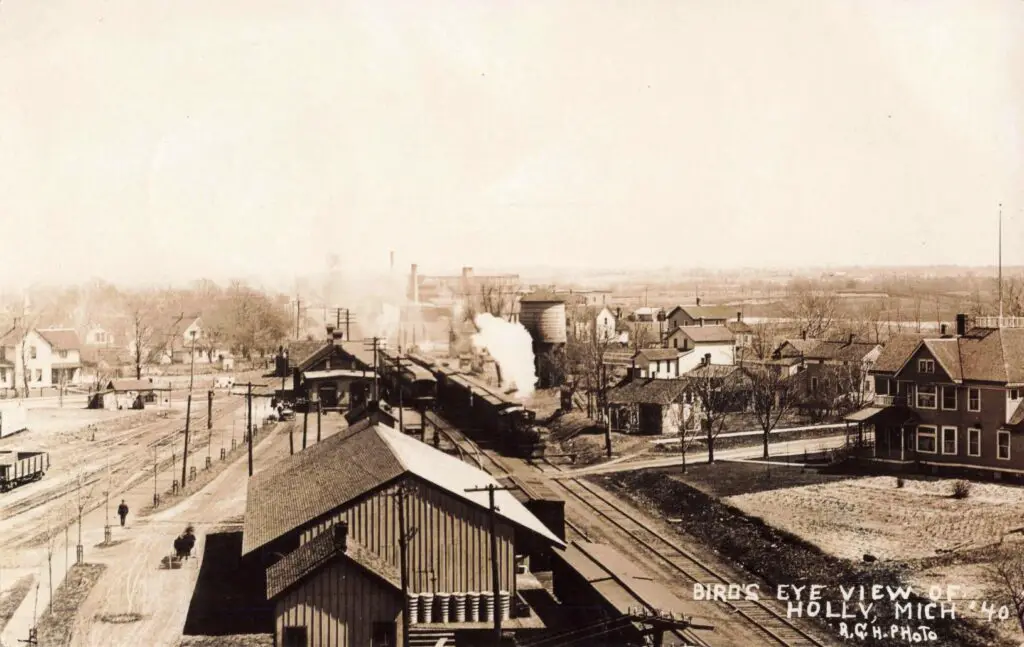
Even as Battle Alley was making headlines, life in Holly carried on in more ordinary ways. The history of Holly Michigan isn’t all brawls and axes – it’s also about industry, innovation, and community. By the early 1900s, Michigan’s great pine forests were logged out, and the lumber boom was fading. Holly’s sawmills slowed down, but the town found new opportunities to keep its economy strong. As one local historian notes, “as the boom time for Michigan lumber decreased, other businesses took their place.”
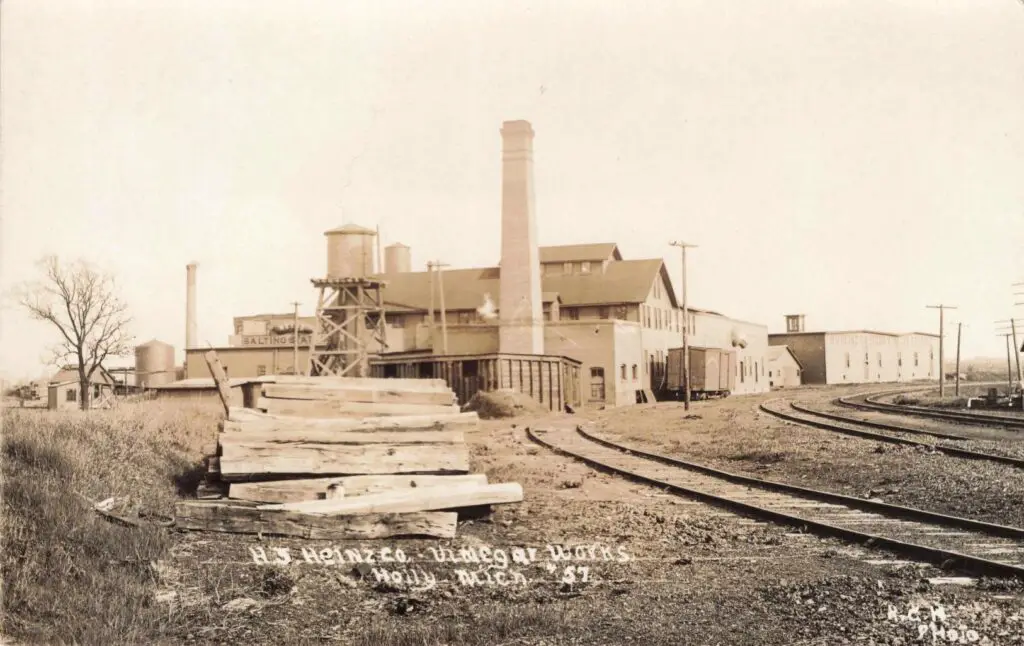
One of those new businesses was downright famous. In 1896, the H. J. Heinz Company – yes, the ketchup and pickles people – built a factory in Holly. The Heinz plant bought thousands of bushels of local apples to brew into cider vinegar for pickling. The operation expanded to become one of the largest vinegar and pickle salting works of its time. The smell of vinegar would waft through Holly’s air, a tangy reminder of the town’s agricultural ties.
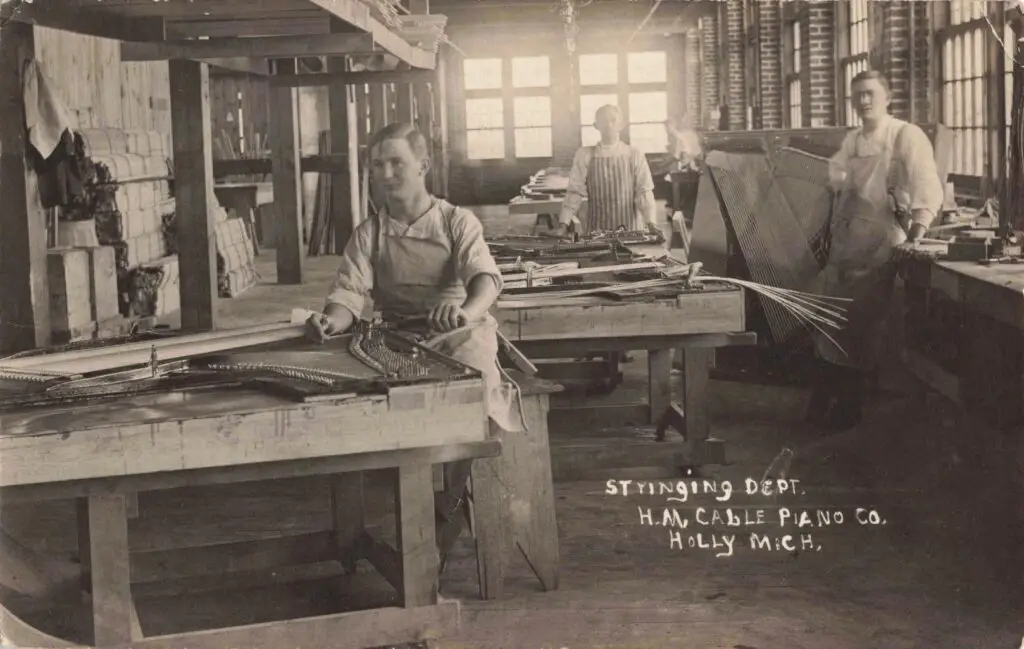
A few years later, in 1908, another big enterprise arrived: the Grinnell Brothers Piano Factory. Grinnell Brothers was a Detroit-based music company that decided to manufacture pianos in Holly. They opened a massive brick factory that was billed as the world’s largest piano factory in its day. By the 1920s, this factory was turning out thousands of pianos, shipping them by rail to showrooms across the Midwest.
Holly’s workers also produced springs and chain-link fencing in other local factories (Hartz Spring and Cyclone Fence), diversifying the town’s industrial base. What had begun as a logging village evolved into a mini manufacturing center. Through the 1910s and 1920s, whistles blew at the factories and freight trains rumbled through town – the soundscape of a community hard at work.
Trials and Triumphs in the 20th Century
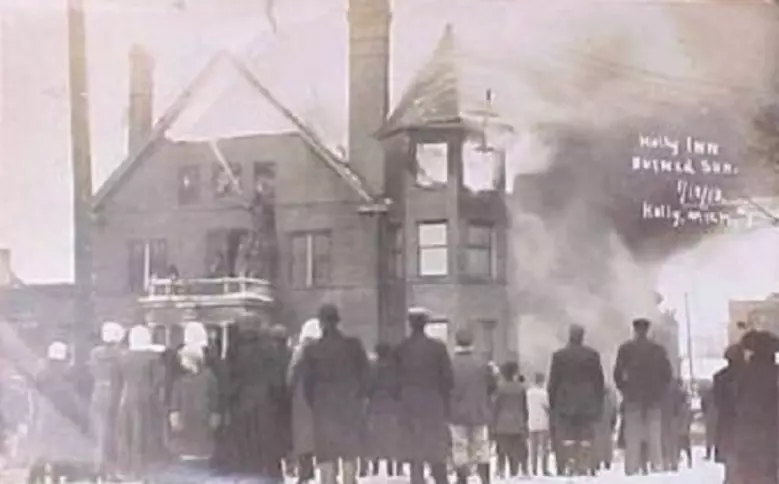
The early 20th century brought its share of challenges to Holly as well. In January 1913, tragedy struck when a fire broke out in the Holly Hotel. The blaze swept through the landmark wooden building, reducing the grand old hotel to charred ruins. For a town that treasured its institutions, the loss of the Holly Hotel was a heavy blow. Yet the people of Holly did not give up on their beloved hotel – they rebuilt it brick by brick. Within a few years, the Holly Hotel rose again on Battle Alley, this time constructed with brick walls (and perhaps a resident ghost or two, local lore says). The restored hotel continued as a social hub for decades to come, proving Holly’s resilience.
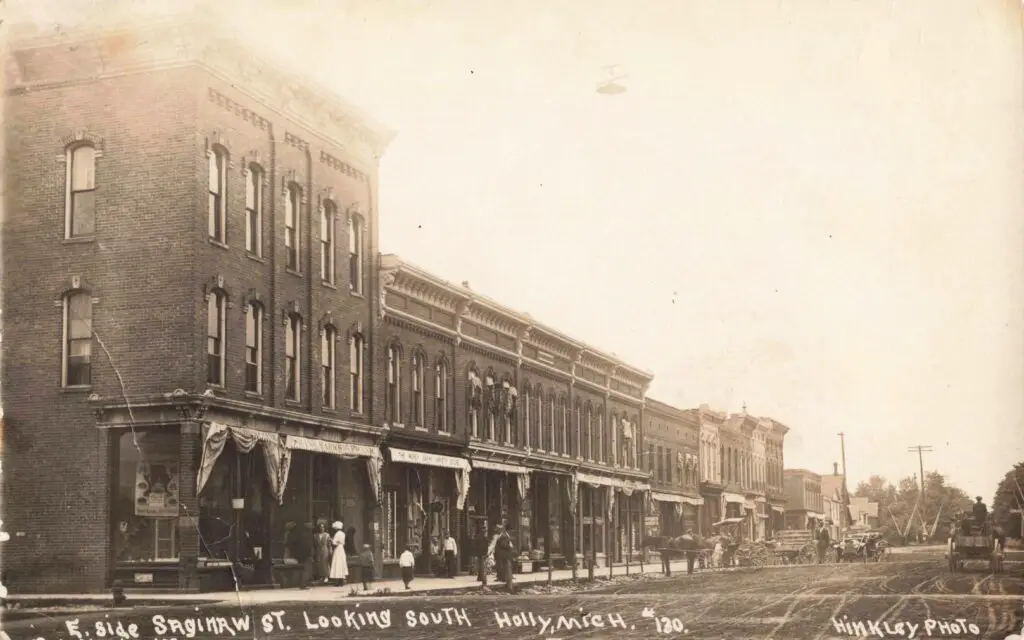
Then came the Great Depression. In the 1930s, economic hard times swept the nation, and Holly felt the strain along with everyone else. Factories scaled back, jobs became scarce, and families tightened their belts. The Heinz vinegar plant, which had thrived for decades, closed its doors in 1931 amid the downturn. Yet, true to form, Holly’s community pulled together. Neighbors planted vegetable gardens in empty lots, shared what they could, and found ways to lift each other’s spirits. The town’s enduring spirit carried it through those bleak years.
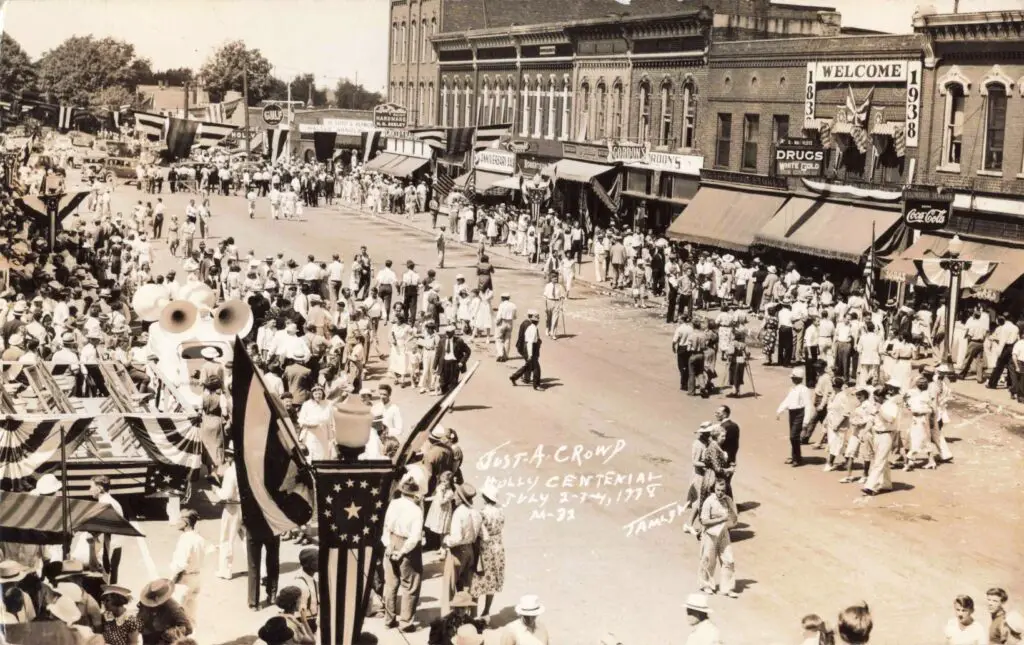
During World War II, Holly contributed to the war effort in both manpower and production. Many young men from Holly served in the armed forces, and at home, the factories likely shifted to wartime needs (producing metal parts, springs, or other goods to support U.S. troops). Residents held scrap drives, collected rubber and tin, and grew “victory gardens” to supplement rationed food. The patriotic fervor united the town toward a common goal. By war’s end, Holly honored its returning heroes and memorialized those who did not return at the village’s monuments and cemeteries.
Holly’s Heritage Lives On
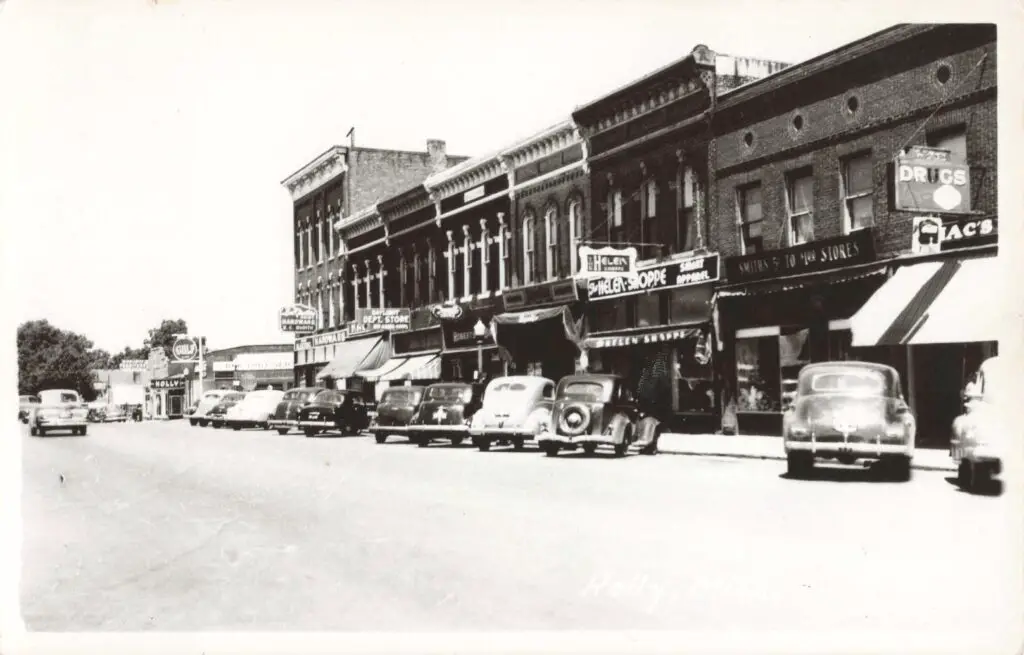
Today, walking through downtown Holly offers charming clues to this remarkable past. The Holly Hotel still stands proudly on Battle Alley – beautifully restored and known statewide for its historic ambiance (and occasional ghost stories). Strolling down Battle Alley now, you’ll find boutiques and cafés where rowdy saloons once stood. A Michigan Historical Marker on the street recounts the famous circus brawl and Carry Nation’s 1908 visit, ensuring that these stories remain alive for new generations. Every year, Holly’s summer festivals and the Holly Dickens Festival at Christmas celebrate the town’s heritage, drawing visitors to experience its small-town charm.
The history of Holly, Michigan is a reminder that even the smallest places can witness extraordinary events. This village saw the transition from the age of lumber to the age of industry, from a rough frontier outpost to a tight-knit community of families and businesses. It weathered fire and economic depression, yet kept its character and pride. Most of all, Holly embraced its colorful stories – the Battle Alley brawl, the hatchet-swinging Carry Nation, the pickle factory and piano works – as proud parts of its identity.
Works Cited
- Holly Hotel. “History of the Holly Hotel.” Holly Hotel (official site), 2025. (Describes the saloon brawls on Martha Street that earned it the name “Battle Alley,” and recounts Carry Nation’s notorious 1908 visit).
- “About Holly.” 2016 Source Book (Fenton, MI), 2016. (Notes Holly’s railroad-era saloons and Battle Alley brawls, and mentions Carry Nation’s six-year campaign against alcohol and her 1908 foray into Holly).
- Holly Historical Society. “Holly History.” Holly Historical Society, Accessed 1 Aug. 2025. (Local history overview naming Battle Alley after an 1885 circus brawl, detailing Carry Nation’s stop in 1908, Holly’s early railroad and lumber boom, and the rise of industries like the H. J. Heinz pickle plant and Grinnell Brothers piano factory).
- Jung, Maura, and Carol Bacak-Egbo. “Mills of Rose Township.” A Place Called Rose, updated 6 July 2019. (Documents the H. J. Heinz Company’s Holly plant, built in 1896 and once the world’s largest vinegar and pickle works, operating until 1931.
- Austin, Dan. “Grinnell Brothers Music House.” Historic Detroit, 17 Mar. 2023. (Notes that Grinnell opened a large piano manufacturing plant in Holly—billed as the world’s largest piano factory—which helped make Grinnell the world’s largest piano distributor by the 1950s).
- Robinson, John. “Carrie Nation and Her Hatchet Comes to Holly, Michigan: 1908.” 99.1 WFMK (Townsquare Media), 13 May 2022. (Describes Carry Nation’s dramatic 1908 “hatchetation” in Holly’s Battle Alley and questions some legendary embellishments of her saloon-smashing campaign)
- Robinson, John. “Historic, Haunted, and Survived Three Fires – The Holly Hotel in Holly, Michigan.” 99.1 WFMK (Townsquare Media), 13 Feb. 2024. (Details the Holly Hotel’s fire of January 19, 1913 – which destroyed the original building – and its uncanny coincidence with a later 1978 fire, contextualizing the hotel’s legendary resilience in local lore).
- Robinson, John. “Born in Michigan: Grinnell’s Music Store, 1872–1981.” 99.1 WFMK (Townsquare Media), 27 Nov. 2023. (Provides history of Grinnell Brothers, highlighting the Holly piano factory and its role in the company’s mid-20th-century expansion as a musical instrument powerhouse).
- American Legion Post 216 (Milford, MI). “Holly Centennial 1938.” The American Legion Centennial Celebration, 4 July 1938. (Records that Holly’s Centennial Celebration took place July 2–4, 1938, including participation by local American Legion members with a commemorative float).
- Holly Herald. Centennial Anniversary Edition. Holly, MI, 30 June 1938. Making of Modern Michigan, Michigan State University Libraries, . (Special newspaper issue published for Holly’s 100-year milestone, featuring historical articles and programs for the 1938 Centennial festivities).
